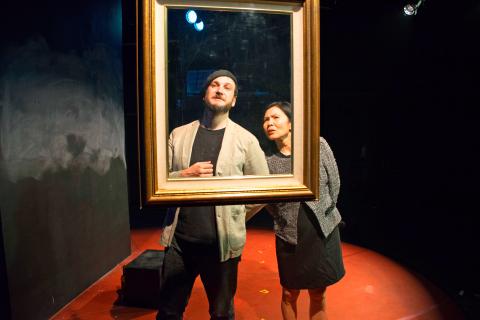LAB Space had its audience laughing up a storm last weekend with its rollicking presentation of American playwright David Ives’ Ives’ Shorts.
Diverse existentialist conundrums is the name of the game as Ives delivers six distinct “shorts” and clearly challenges actors and actresses to handle multiple roles with a variety of witty and changing dialogues. Guest directors Ting Kao (高詩婷) and Andrew Chao (周厚安) have chosen and directed their cast well and found new talent in the process.
James Lo (羅濟豪), one of many newcomers to LAB, is at his best in Words, Words, Words, the classic test to prove the “Infinite Monkey Theorem.” In Sure Thing, he had run a gamut of pick-up lines with a blossoming Carrie Mo (莫少宣) and in The Philadelphia, he enjoyed the carefree spirit of being in “Los Angeles,” as opposed to Victor Stevenson’s “funky Philadelphia.” But here as the pragmatic “Milton,” he shows how a chimp can manipulate the system to get smokes. At the same time, of course, he argues practically with the plotting Swift, Charlie Storrar, that they should just type “Hamlet” (whatever that is) and get out of there.

Photo courtesy of Cheng Yi-lee
Out for revenge on the unseen yet “observing” Dr Rossenbaum, Storrar fiendishly plots a poison-tip sword death reminiscent of Shakespeare’s Laertes to do the job.
Storrar is not done; he adroitly handles other roles. In Degas C’est Moi, he pontificates as an imaginative and whimsical Degas for a day while other cast members as typical New Yorkers condescendingly ignore him. In Variations, as the pondering, cerebral Trotsky, he seeks reprieve while his inquisitive and “sometimes dutiful,” wife Sharon Landon assists.
Not to be ignored in this ensemble is Angela Collengberg. As the more focused chimp Kafka in Words, she actually gets the play done. But her best role is when she transforms from stuttering shyness to masterful “linguist” with the coaching effervescent Stevenson in Universal Language.
The set is minimalist and a merry-go-round concept of entering and leaving provides a neat, systematic way to change sets. This is live theater at its best.

That US assistance was a model for Taiwan’s spectacular development success was early recognized by policymakers and analysts. In a report to the US Congress for the fiscal year 1962, former President John F. Kennedy noted Taiwan’s “rapid economic growth,” was “producing a substantial net gain in living.” Kennedy had a stake in Taiwan’s achievements and the US’ official development assistance (ODA) in general: In September 1961, his entreaty to make the 1960s a “decade of development,” and an accompanying proposal for dedicated legislation to this end, had been formalized by congressional passage of the Foreign Assistance Act. Two

Despite the intense sunshine, we were hardly breaking a sweat as we cruised along the flat, dedicated bike lane, well protected from the heat by a canopy of trees. The electric assist on the bikes likely made a difference, too. Far removed from the bustle and noise of the Taichung traffic, we admired the serene rural scenery, making our way over rivers, alongside rice paddies and through pear orchards. Our route for the day covered two bike paths that connect in Fengyuan District (豐原) and are best done together. The Hou-Feng Bike Path (后豐鐵馬道) runs southward from Houli District (后里) while the

March 31 to April 6 On May 13, 1950, National Taiwan University Hospital otolaryngologist Su You-peng (蘇友鵬) was summoned to the director’s office. He thought someone had complained about him practicing the violin at night, but when he entered the room, he knew something was terribly wrong. He saw several burly men who appeared to be government secret agents, and three other resident doctors: internist Hsu Chiang (許強), dermatologist Hu Pao-chen (胡寶珍) and ophthalmologist Hu Hsin-lin (胡鑫麟). They were handcuffed, herded onto two jeeps and taken to the Secrecy Bureau (保密局) for questioning. Su was still in his doctor’s robes at

Mirror mirror on the wall, what’s the fairest Disney live-action remake of them all? Wait, mirror. Hold on a second. Maybe choosing from the likes of Alice in Wonderland (2010), Mulan (2020) and The Lion King (2019) isn’t such a good idea. Mirror, on second thought, what’s on Netflix? Even the most devoted fans would have to acknowledge that these have not been the most illustrious illustrations of Disney magic. At their best (Pete’s Dragon? Cinderella?) they breathe life into old classics that could use a little updating. At their worst, well, blue Will Smith. Given the rapacious rate of remakes in modern